'The benchmark was set by Dr Sarabhai.'
'If there is a problem, everybody would be encouraged to come up with a solution.'
'The final solution will be the result of all the inputs.'
'This is passed on through time.'
'Even today, you see that nobody wants to take particular credit on a success.'

With the success of Chandrayaan-3 on August 23, 2023, ISRO has become the flavour of the season.
While applauding the success of those behind the latest success, it is also time to look back at the time when rockets were carried on bicycles.
For those who have come in late, this story is about a scientist who was picked up by Vikram Sarabhai as one of the first engineers at the space centre he was planning in Thiruvananthapuram. That was six decades ago. In 1962.
He was Ramabhadran Aravamudan, popularly known to friends and colleagues as Dan.
Gita, a well-known journalist, married Dan in 1970 and moved to Thiruvananthapuram, thus becoming a part of the ISRO story. They lived there for more than two decades till Dan was appointed director of the ISRO Satellite Centre in Bangalore.
"ISRO is a very nurturing kind of organisation," Gita Aravamudan tells Rediff.com's Shobha Warrier in the concluding part of a fascinating two-part interview.
- PART 1: 'ISRO was their first wife'

We have heard a lot about the friendship between Dan and A P J Abdul Kalam. Because Kalam was a bachelor, did he used to come to your house for meals?
Of all the people, these two were very close as they spent some time at NASA together.
In Trivandrum, they used to go out to have vegetarian food.
After our marriage, Kalam would come home to have masala dosa on Sundays. He was also very fond of puliyodarai.
Before I came, they used to go and watch all the English films that was shown at the Sreekumar theatre. This continued even after I joined them.
I remember when a new English film was released there, half the theatre would be filled with people from ISRO and their families only.
After that, you would see the entire gang in a restaurant close by that served north Indian food.
They had also started a Rocket Club in Trivandrum and Dan was the first secretary of the club.
The main entertainment for all of us was playing shuttle badminton at the club. The prize for the winner was the famous Trivandrum bonji (a special lime juice)!

I also remember when I came to Trivandrum, I didn't have a typewriter with me. When Dan mentioned it to Kalam, he gave his typewriter to me. I used it till Dan bought one on one of his trips abroad.
There is a funny story about how they passed time in Trivandrum in the initial days as there was nothing to do in the city. They used to walk up and down the streets which Dan called sanitary inspection of roads!
They used to laugh about their work as sanitary inspectors.
When Kalam was chosen to be President of India, I asked him, 'Kalam, when you were doing sanitary inspection with Dan in Trivandrum, did you ever dream that one day you were going to be President of India?'
He laughed so much hearing my question and said, 'If somebody had told me that one day, I would be President of India, I would have laughed like this'.
After he became President, he kept inviting us to Rashtrapati Bhavan.
After writing the preface for my book, Disappearing Daughters, he said he would like to release it at Rashtrapati Bhavan as he couldn't do it publicly.
I was delighted! My publisher also was extremely happy.
We went to Delhi, and he made us stay at the Rashtrapati Bhavan for one whole week as his VVIP guests. And he released the book in the chambers.
You recently wrote about the team spirit at ISRO. Did you ever wonder what is it about ISRO that makes them work so passionately and as a team? How were they able to pass on the team spirit to those working even today?
I think the benchmark was set by Dr (Vikram) Sarabhai. That was because he encouraged young people to come up with ideas.
In the early days, he used to ask all of them to give ideas. The team would then sit and choose the best idea. And that idea would be the team's idea and will not be attributed to any one person. That was how it started.
Dan used to tell me that for every project, from the top-most project director to the youngest intern, everybody would be called for the meetings. And all would be encouraged to talk and come up with ideas in those meetings.
If there is a problem, everybody would be encouraged to come up with a solution. The final solution will be the result of all the inputs.
This is passed on through time. Even today, you see that nobody wants to take particular credit on a success.

Is it not surprising that even after all these decades, even under various leaders, this continues?
It is. The idea of team spirit is a great thing and somehow it is passed on. A lot of credit goes to all the people who came after and kept the spirit alive. They also encouraged the next generation to do the same.
Sometimes I think it is like magic, and the magic continues.
People like Madhavan Nair knew Sarabhai, and passed on what Sarabhai believed in. In fact, Madhavan Nair was recruited by Dan in Mumbai, he was one of Dan's favourite scientists.
Even the women who have come to the top, say they never felt left out or discriminated against. Whoever is willing to plunge in and take responsibility, is encouraged to do so.
So many women are travelling abroad and working day and night, and they have become project directors working on very complex technology.
It shows ISRO is a very nurturing kind of organisation.
What do you think Dan must have felt regarding the success of the Chandrayaan mission?
In the epilogue of his book, Dan had written that he had sat in the control rooms with accelerating heartbeats when many exciting missions like the Chandrayaan or the Mars mission had taken off and shared the exhilaration among colleagues.
He also wrote, 'I have watched politicians of the day proudly acclaiming ISRO's feat nationally and internationally almost as if those were their own achievements'.
I can say, Dan would have been very, very, proud of Chandrayaan. He would have been absolutely thrilled with it.
Feature Presentation: Ashish Narsale/Rediff.com

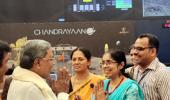

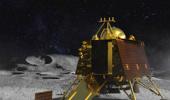



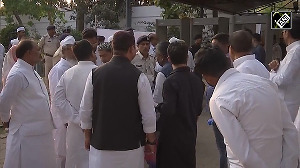
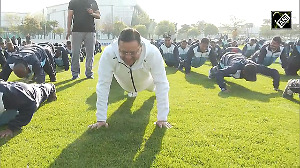
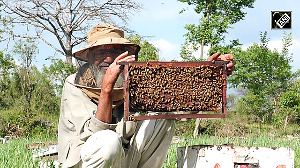
 © 2025
© 2025